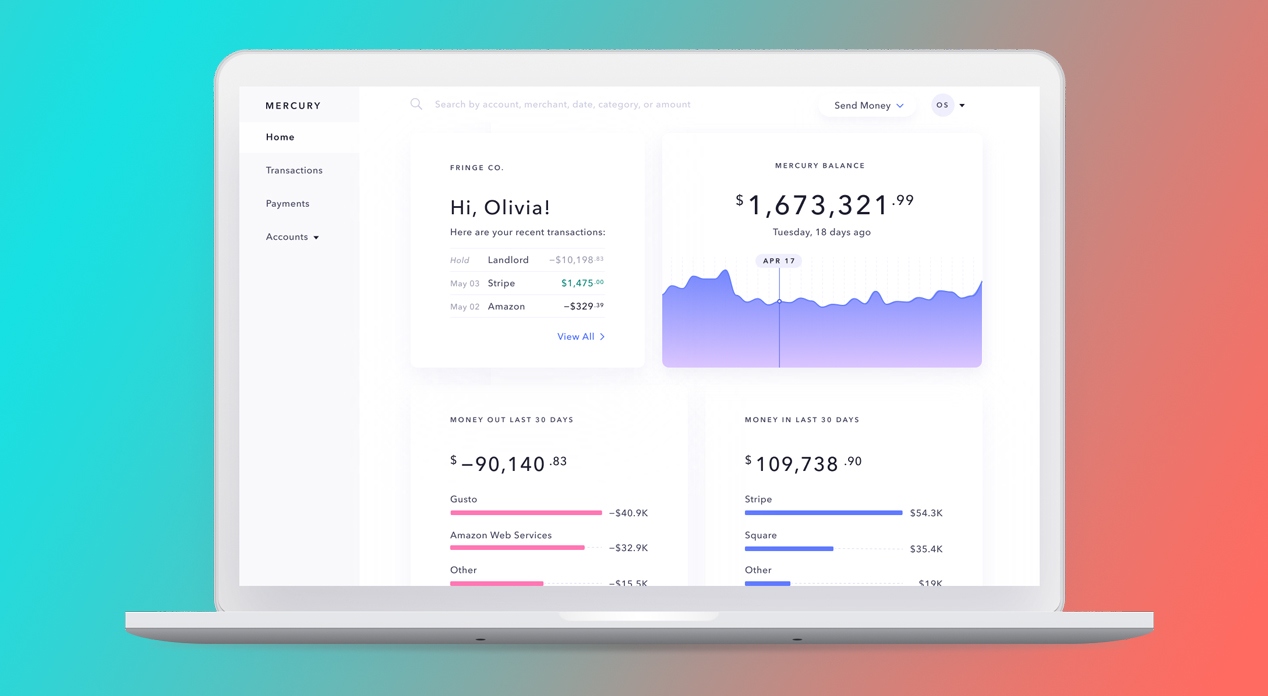Mercury: Banking for a New Digital Economy
It’s about time
There are two good reasons why Mercury, an online banking platform, is the bank for startups we've been waiting for.
The first is that almost all real startups—smaller companies which are just getting started—don’t have CFOs, don’t have banking connections, and don’t have the balance sheet bluster to get financial institutions bending over backwards to meet their specifically-modern needs.
In fact, it’s likely most core members of a startup team—well-versed in everything from coding to creativity to networking—have near-zero know-how when it comes to business money management.
The second reason is that the banking industry itself—these days dominated by but a fistful of behemoths in the US—have had little incentive to innovate modern products geared for light, lean and tech-savvy startups.

Mercury CEO Immad Akhund says it best:
“Business needs have evolved and existing banks are not keeping up with that change ... We want to be a technology-first bank that actively helps your business succeed.”
Of course, beyond the above two more institutional reasons for Mercury’s rise, there are plenty of other great selling points to keep in mind:
Mercury is easy to use (unlike trying to constantly navigate between banking statements and homemade spreadsheets)
It’s free and easy to set up a checking account, debit card, and savings, and super cheap to use (unlike the costly byzantine banking service-fee system)
It includes other add-on services like analytics, estimates, and access to a wealth of Silicon Valley community wisdom (unlike big banking power structures which enforce insider/outsider dynamics to guard their trade secrets)
The cost and benefits of a Mercury account
Insurance
Working right off your laptop, Mercury opens up FDIC insured checking and savings bank accounts for your team, meaning your funds are insured for up to $250K.
Quick history lesson: The Federal Deposit Insurance Corporation (FDIC) was started by FDR in the wake of the Great Depression as part of his New Deal, to shore up against bank runs and the threat of banks running out of cash. It’s still a noble institution which offers peace-of-mind and security to businesses going through precarious growing pains.
Interest
Interest, which could be thought of as the degree of the integrity of money, is often considered something only huge institutional investors or cavalier speculators can benefit from. With Mercury, you get a guaranteed 1% rate on whatever’s in your savings account, and 2% if you keep a balance above $250K. Not too shabby in today’s post-2008-hangover QE climate.
No fees
Your team gets a debit card (there's no credit card or line of credit lending as of yet), for which Mercury charges zero fees (only ATM fees apply). There are also no monthly fees and no account fees. You can also send and deposit checks for free. In fact, the only fees are for wire transfers, which cost $5 for domestic transfers and $35 for international ones.
Alerts
Other services include a block on overdrafts and an auto-notification feature when account balances go into the red. These are some highly practical features for budding companies when scarce funds have to be allocated as wisely and efficiently as possible, and every wasted buck means wasted opportunities down the line.
Access
Finally, it’s easy to add or remove access to the account for new team members. Bookkeepers can also be granted access to the accounts, where they can view everything, but won't be able to transact.

Mercury’s functions and features
Mercury was designed to be much more user-friendly than standard online banking platforms. It has the look and feel many of us are accustomed to from using other tech platforms and apps.
Simple UI
Upon releasing User Inyerface, Bagaar suggested that 90% of users take UI for granted, but not Mercury. The dashboard offers an instant glance at your savings balance, which could be adjusted to show the balance for any past day.
There’s also a list of recent transactions, and lists showing all money out and all money in for a given period. The date picker, meanwhile, makes it easy to search historical transactions.
Sending money via wires or ACH transfers can be done with no more than three clicks. The ability to search and filter all past transactions by merchant, account, category, or even amount is always right up top the dashboard for instant results.
Analytics and integrations
Mercury’s analytics feature is another huge selling point. Traditional banks might do breakdowns for their customers on request, often by appointment, and using their proprietary black-box software—but this just won’t cut it in a fast-paced digital environment.
At the moment, Mercury offers some basic cashflow analytic tools (revenues, costs, etc.), which can be viewed and reviewed countless times per day for instant and up-to-date stats. They’re also currently working on bolstering their analytic powers with integrations with Stripe, Square and Gusto.
Speaking of integrations and cross-platform functionality, all Mercury transaction documentation is in CSV format. This means they can be easily imported into financial software like Quickbooks and Xero.
The wisdom of crowds
Mercury recognizes that so many tech companies that fit under the startup umbrella have a lot of similar challenges, and consequently have a lot of insights worth sharing. In other words, they’re creating a knowledge-community around financial issues to further aid their customers.
To do this, they’ve got many of their investors into a program which offers advice. One of the most unique and impressive features is the Y Combinator practice interview (happening now until June 16). Here Mercury customers can sign up for a 15-minute video conference call with many startup founders and YC alumni.

A tech-tuned bank app for generation startup
The Roman god, Mercury, was the god of, among other things, business, trade and financial success—indeed, the name Mercury itself has etymological connections to merchants and markets.
So as a company moniker, the San Francisco team couldn’t have made a more apt selection when they went in search of backing back in 2017. But it was more than a clever name that got them the support of VC Andreessen Horowitz, L2 Ventures, SV Angel and more.
It might have had something to do with founders Akhund, Max Tagher and Jason Zhang and their combined experience in computer science and startup launching; Akhund himself founded three startups prior to Mercury, including Heyzap, co-founded with Tagher and Zhang, which they sold for $45 Million.
But the real reason behind Mercury’s promise is simple: They’ve zeroed in on a major hole in the startup world and filled it with an almost-free banking platform that looks, feels and speaks the 21st-century language of the digital economy.




